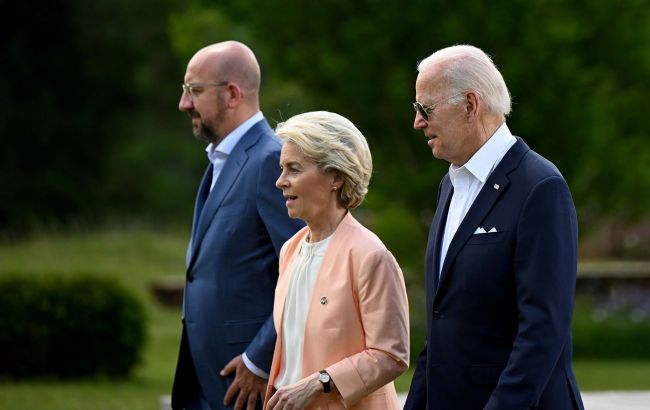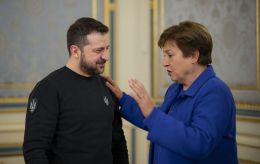Money will arrive. Why U.S. and EU delay aid and what Ukraine's expectations are
 Photo: Joe Biden, Ursula von der Leyen, and Charles Michel (Getty Images)
Photo: Joe Biden, Ursula von der Leyen, and Charles Michel (Getty Images)
The Ukrainian government is confident that the support from the West will continue next year, both from the United States and Europe, according to sources interviewed by RBC-Ukraine in various government agencies.
While preparing this article, data from the Institute for the Study of War (ISW), statements from the Ministry of Foreign Affairs, public statements by President Volodymyr Zelenskyy, and information from sources interviewed by RBC-Ukraine in various government agencies were used.
Due to delays in providing large aid packages from the United States (due to the situation in Congress) and the European Union (due to the veto by Hungarian leader Viktor Orban), numerous Western media report that in the absence of Western assistance in 2024, Ukraine may suffer serious setbacks on the battlefield, up to a complete defeat in the war with Russia.
In particular, the American Institute for the Study of War (ISW) has come to such conclusions. "The halt of Western aid will likely lead to the final collapse of Ukraine's ability to restrain the Russian army," analysts believe.
What the government says
However, numerous sources within various government agencies, as reported by RBC-Ukraine, assure that despite the delays, the issue of assistance will be successfully resolved. This will enable Ukraine to continue its military operations against the occupiers and sustain its economy and social sphere.
"I am sure that the United States will not let us down, and what we agreed upon in the U.S. will be fully implemented," said President Volodymyr Zelenskyy at the latest press conference.
According to the publication, there is a bipartisan consensus in the United States regarding providing assistance to Ukraine. Moreover, in the aid package proposed by U.S. President Joe Biden, it addresses not only Ukraine but also Israel and Taiwan, which are important countries even for Republicans critical of Ukraine. Therefore, the resolution of the issue related to migrants and strengthening the American-Mexican border, demanded by Senate and House Republicans, is indeed a real reason why Congress is not voting for assistance to Ukraine. After finding a compromise between the White House and Republicans on the migration issue, expected in January, assistance to Ukraine will soon be voted on, say sources interviewed by RBC-Ukraine.
"As for the external front, I am calm; we will receive everything," said a source in the presidential circle.
Regarding the allocation of 50 billion euros from the EU over the next four years, the fundamental decision on their allocation has already been made at the pan-European level. At the extraordinary summit of the European Union on February 1, it will be decided how this support will be provided. In the event that Hungarian Prime Minister Viktor Orban can be persuaded to lift his veto on supporting Ukraine, the funds will be allocated from the entire EU. If Orban continues to maintain the veto, then the 50 billion for Ukraine will be proportionally divided among the remaining 26 EU countries and provided to Kyiv on a bilateral basis.
Assistance from the West will be in the same format
Military-political analyst Oleksandr Kovalenko is convinced that military-technical and material assistance from Western partners in 2024 will remain in the same format. He stated this in a comment to RBC-Ukraine.
"It may have only a temporary pause. This primarily concerns the United States due to their internal political battles. But later, they will come out of this pause when a consensus is reached between Democrats and Republicans and when the corresponding bill is adopted," the expert said.
He added that even if these battles drag on, the United States is currently considering a "Plan B" – redirecting the frozen $300 billion in Russia to aid Ukraine. Regarding support from European countries, the situation is currently developing positively for us, clarified Kovalenko.
He reminded that recently there was information that Germany is sending 120 Marder infantry fighting vehicles to Ukraine – three times more than planned. It was also revealed that the 1000th Roshel Senator armored vehicle from Canada has arrived, although initially, it was only about 200 such vehicles.
"In addition to everything else, European Union countries continue to supply us with other weapons, address issues with ammunition, and in the long term. Contracts for the production of ammunition in European countries are now being concluded not only for 2024 but also for 2025. Therefore, assistance will continue in the future; the only thing that needs to be resolved is the issue of short-term financing," Kovalenko explained.

